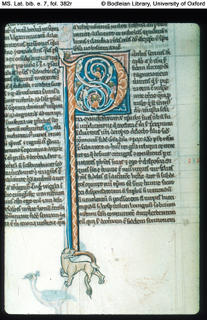The Epistle of St. Paul to Titus, chapter 3
1 Admonish them to be subject to princes and powers, to obey at a word, to be ready to every good work.
2 To speak evil of no man, not to be litigious, but gentle: shewing all mildness towards all men.
3 For we ourselves also were some time unwise, incredulous, erring, slaves to divers desires and pleasures, living in malice and envy, hateful, and hating one another.
4 But when the goodness and kindness of God our Savior appeared:
5 Not by the works of justice, which we have done, but according to his mercy, he saved us, by the laver of regeneration, and renovation of the Holy Ghost;
6 Whom he hath poured forth upon us abundantly, through Jesus Christ our Savior:
7 That, being justified by his grace, we may be heirs, according to hope of life everlasting.
8 It is a faithful saying: and these things I will have thee affirm constantly: that they, who believe in God, may be careful to excel in good works. These things are good and profitable unto men.
9 But avoid foolish questions, and genealogies, and contentions, and strivings about the law. For they are unprofitable and vain.
10 A man that is a heretic, after the first and second admonition, avoid:
11 Knowing that he, that is such an one, is subverted, and sinneth, being condemned by his own judgment.
12 When I shall send to thee Artemas or Tychicus, make haste to come unto me to Nicopolis. For there I have determined to winter.
13 Send forward Zenas, the lawyer, and Apollo, with care, that nothing be wanting to them.
14 And let our men also learn to excel in good works for necessary uses: that they be not unfruitful.
15 All that are with me salute thee: salute them that love us in the faith. The grace of God be with you all. Amen.
In today's meeting there was much discussion about whether verses 4-6 refer to Baptism, and whether this Baptism rightly can be given to infants. Of course the Catholics in the group answered 'yes' to both questions, although among the rest of the group the answers were somewhat mixed.
Most seemed to agree that Baptism of adults and older children should not be given without some expression of faith by the recipient.
There was less agreement on Baptism and infants. Some members were not comfortable with the idea that infants, apparently without any expression of free will, could legitimately receive Baptism.
But consider the status of infant males under the Old Covenant. They were made part of the covenant through circumcision on the "eighth day", and this rite was imposed upon infants by their parents in obedience to an uncompromising divine edict that made no provision for obtaining the child's consent:
Genesis chapter 17
12 An infant of eight days old shall be circumcised among you, every man child in your generations: he that is born in the house, as well as the bought servant shall be circumcised, and whosoever is not of your stock:
13 And my covenant shall be in your flesh for a perpetual covenant.
14 The male, whose dash of his foreskin shall not be circumcised, that soul shall be destroyed out of his people: because he hath broken my covenant.
Scripture is clear that circumcision made infant males members of the Old Covenant. As Hebrew children grew in age and understanding, they became accountable for living out their faith in obedience to God's will.
Scripture is likewise clear that the New Covenant founded by Christ is greater than the Old in every way, and its ceremony of initiation -Baptism- is offered to all persons. Consider Saint Peter's Pentecost sermon:Acts chapter 2
37 Now when they had heard these things, they had compunction in their heart, and said to Peter, and to the rest of the apostles: What shall we do, men and brethren?
38 But Peter said to them: Do penance, and be baptized every one of you in the name of Jesus Christ, for the remission of your sins: and you shall receive the gift of the Holy Ghost.
39 For the promise is to you, and to your children, and to all that are far off, whomsoever the Lord our God shall call.
Many Protestants would say that Peter clearly required that all must positively repent prior to Baptism. But if this were so it would impose a restriction upon entry to the New Covenant that was not present in the Old Covenant in the case of young children. It's important to realize that Peter was answering an adult question: "What shall we do?". And Peter's answer was to those equipped to hear and respond to it: You must repent and be baptized.
But Peter immediately affirms that "the promise is to you, and to your children, and to all that are far off, whomsoever the Lord our God shall call." Therefore, three thousand were Baptized that day. Is it plausible that the children in the crowd were denied Baptism after Peter's explicit teaching that the promise was for the adults and their children? In light of Peter's exhortation it is hard to think that men, women, or children were denied Baptism that day.
Ceremonial entry to the New Covenant is glorious in comparison with the Old. It visibly embraces both women and men; it embraces Jew and non-Jew; it embraces old and young -even infants! Peter and Paul are adamant that in Baptism what really counts is not so much what the recipient is doing, but rather what God is doing. It is God that makes Baptism effective. It is God -not man's words or beliefs- that initiates regeneration, renewal, and new life. So long as man cooperates to the extent God enables him, Baptism delivers all the spiritual goods that Scripture promises.
While circumcision truly brought even infants into the Old Covenant, it did not bring about spiritual regeneration. Baptism does both, and because the power depends on God's passionate desire to call all persons to receive eternal life, He imparts regeneration and renewal to every recipient of Baptism who does not place an obstacle in God's way.
This is why infants not only can be Baptized, but why they should be Baptized by their parents with great joy and at the earliest practical opportunity.
Tuesday, July 26, 2005
Titus 3: Baby gets a bath
Posted by
John F Robin
at
7/26/2005 08:24:00 PM
0
comments
![]()
Labels: Baptism, sacraments
Monday, July 11, 2005
Titus 1: "...I also appointed thee"

The Epistle of St. Paul to Titus, Chapter 1
1 Paul, a servant of God, and an apostle of Jesus Christ, according to the faith of the elect of God and the acknowledging of the truth, which is according to godliness: 2 Unto the hope of life everlasting, which God, who lieth not, hath promised before the times of the world: 3 But hath in due times manifested his word in preaching, which is committed to me according to the commandment of God our Savior: 4 To Titus my beloved son, according to the common faith, grace and peace from God the Father, and from Christ Jesus our Savior. 5 For this cause I left thee in Crete, that thou shouldest set in order the things that are wanting, and shouldest ordain priests in every city, as I also appointed thee: 6 If any be without crime, the husband of one wife, having faithful children, not accused of riot, or unruly. 7 For a bishop must be without crime, as the steward of God: not proud, not subject to anger, not given to wine, no striker, not greedy of filthy lucre: 8 But given to hospitality, gentle, sober, just, holy, continent: 9 Embracing that faithful word which is according to doctrine, that he may be able to exhort in sound doctrine, and to convince the gainsayers. 10 For there are also many disobedient, vain talkers, and seducers: especially they who are of the circumcision: 11 Who must be reproved, who subvert whole houses, teaching things which they ought not, for filthy lucre's sake. 12 One of them a prophet of their own, said, The Cretians are always liars, evil beasts, slothful bellies. 13 This testimony is true. Wherefore rebuke them sharply, that they may be sound in the faith; 14 Not giving heed to Jewish fables and commandments of men, who turn themselves away from the truth. 15 All things are clean to the clean: but to them that are defiled, and to unbelievers, nothing is clean: but both their mind and their conscience are defiled. 16 They profess that they know God: but in their works they deny him; being abominable, and incredulous, and to every good work reprobate.
I risk repetition on the topic of apostolic authority, but it's only because Paul repeatedly stresses this central theme in his letters. In his letter to Titus Paul raises the matter again before he even concludes his greeting!3 But hath in due times manifested his word in preaching, which is committed to me according to the commandment of God our Savior... 5 For this cause I left thee in Crete, that thou shouldest set in order the things that are wanting, and shouldest ordain priests in every city, as I also appointed thee
How does Paul understand God's word to be "manifested" "in due times"? Elsewhere he elaborates on Jesus Christ as the Word made flesh, but here his focus is on the Word of God in its verbal form, which is transmitted primarily "in preaching", and by teachers designated through the authority of the apostles. 
By whose preaching? Paul's... and the other apostles and those whom they have ordained to the task. Again and again through Paul's letters he refers to the special commission that the apostles have uniquely received, and which distinguishes them as authoritative both in teaching and in governing the Church. Paul's Church is not one in which one is a teacher or pastor simply because he feels the urge, or because his friends voted to approve him to the role. It's a matter of apostolic authority, and Paul is uncompromising on it. For him it's vital to preserving and proclaiming the full Gospel in a world in which there are so many distorted gospels and counterfeit teachers.
In this chapter, he reminds Titus that just as he, Paul, was "committed" the Gospel by the "commandment of God", so he has now appointed Titus to carry on this mission and to carefully appoint other men to share in this role through the ministries of priest ("presbyter") and bishop ("overseer").
Throughout these letters to Timothy and Titus, does Paul ever offer an alternative to this model of apostolic ministry?
Posted by
John F Robin
at
7/11/2005 08:09:00 PM
0
comments
![]()
Labels: apostolic tradition


